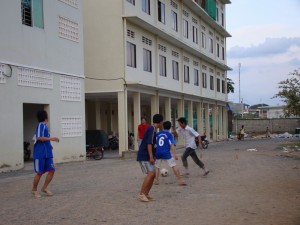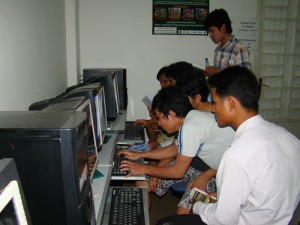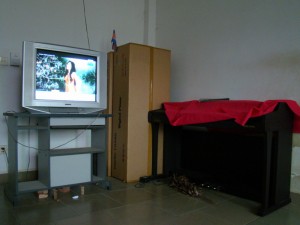Some wealthier students don’t need to worry about money while they’re studying at university. But most of us do. Although it would be great to forget about finances and give 100{0a5c1eeb84ccc7c2d601964b33dd4fc73dc6a68f91616e3e53041e90b1033ab3} of our time and effort to our studies for the 4 or 5 years that we are enrolled at university, it is not a reality for the majority of university students coming from middle class backgrounds who must continue to make money for themselves and their family.
Even if you have a scholarship, studying can be expensive when you consider the cost of books, transportation and other academic materials; however, it is not the cost of education, but rather the opportunity cost, that forces most students to find a job on the side. Most families in the Kingdom rely on their children to bring in an income when they reach working age. Therefore, university has two costs; the tuition fee and the lost income that would be made if the student were working instead.
For many students who see university as the only way to take an economic step up, the solution is finding a job to help support them through their studies. Balancing work and classes is a challenge that can leave students over-tired and unfocused in class, but it doesn’t have to. We talked to students, educators and career experts who explained how a part-time job can help students rather than hurt them on their way to professional success.
“Some people repeat that they don’t have time for a job,” said 22-year-old Ty Phearom, “but in fact they just don’t know how to use their time efficiently and wisely.” The senior at the Institute of Foreign Languages (IFL), who has been working as a part-time teacher at the Student Development Institute since his first year at university, said that his experience on the job gave him the additional benefit of being able to apply the theory he was learning in class in a practical setting while at work.
The importance of finding a job related to your course of studies was echoed by Chy Meath, a consultant at Aplus Consulting Company. He said that students who get professional experience relevant to their major will invariably improve their abilities and raise their chances of finding a job upon graduation. Even if students can’t find part-time work closely related to their studies, Chy Meath said that part-time work can provide a surprise professional spark. “Sometimes students will become interested in their part-time work and end up doing that when they graduate,” he said.
Last month Nhem Ratbothea, a 22-year-old sophomore in IT at the Royal University of Phnom Penh (RUPP), decided to take a job as a waiter at Hotel Phnom Penh. Besides allowing him make money and cut down on his families expenses, he said his first job since leaving his hometown of Banteay Meanchey, although unrelated to his courses in IT, will have the added benefit of helping him improve his English language skills, which might prove important down the road.
According to Chy Meath, students tend to overemphasize the responsibilities of their part-time work altogether, overlooking the workplace environment of their prospective employer, which is just as important to a student’s sanity. “If you have fun and the co-workers are friendly and patient with good management, it will be beneficial,” explained Chy Meath. “If you go to work and your co-workers just shout and ignore each other, whether or not you are highly paid, it will have a negative effect on you.”
While the benefits of part-time work extend beyond the obvious increase in income, others are rightfully concerned about negative effects on student’s academics. If possible, Ngov Simrong, a mathematics teacher and also a chief of Academic Office at Norton University, suggests that families find a way to support their children through university so they can focus on their studies.
“When they have to work, they will become tired,” he said. “So when they are in class they aren’t focused on the teacher’s explanation, they just sit waiting for time to pass because they are so exhausted.” If the family has the financial ability, he advised that they “don’t allow their children to work while studying because they won’t reach their full potential.”
To make academics more manageable, some students alter their work schedule, or end it altogether, come crunch time. As an undergraduate, Sa Sokheang, who just graduated with an accounting degree from Vanda Institute, got a job as a salesperson at Snow Yogurt where, after proving herself, she got a promotion an became an accountant. While the work aligned with her academic interests, she said that being busy from early in the morning to 9 at night took a toll on her.
“Working part-time had an effect on my academic performance because sometimes I would come from work and find myself too tired to find time to study,” she said. With final exams approaching, Sa Sokheang was worried that she wouldn’t have time to prepare for she left her position at Snow Yogurt to ensure ample time for research and reading.
While educators agreed that juggling classes with a job presents a unique challenge, some are willing to cooperate with students to make arrangements that prevent significant sacrifices to their studies. Khan Chandy, an English teacher at IFL, mentioned one student who made a formal request to come to class 30 minutes late so he could fulfill his obligations at work and school, since he cared deeply about both. “His attitude in class was good and his scores remained among the top ten in the class,” the professor explained.
Vong Chorvy, a quality assurance officer at RUPP, said that getting a job is fine as long as academic focus students can maintain their academic focus. “It’s good for those who are studying and working, but they shouldn’t forget that studying is still most important,” he said. “Absorbing theoretical knowledge about their field of study is very important because later on, when students graduate, they have to apply it in order to succeed in that profession.”
by: Dara Saoyuth This article was published on Lift, Issue 40 published on October 13, 2010



